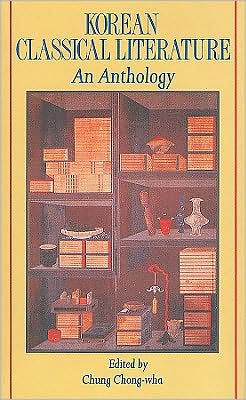

 |

|

The average rating for Korean Classical Literature based on 2 reviews is 4 stars.
Review # 1 was written on 2017-07-23 00:00:00 Erica Dragoo Erica DragooThe millet is dense and tall, The sorghum is in sprout. I walk on slowly, My heart shaken within me. Those who know me say that my heart is sad; Those who do not know me ask for what I am searching. Oh, grew heaven stretching endlessly away, Who has done this to me? . . . The peony symbolized true love. Field mouse - term used to indicate the despotic ruler. In the Seventh Month In the seventh month Antares sinks in the west, In the ninth, cloth is handed out for making clothes, In the eleventh month the wind blows keen, In the twelfth the weather turns cold; But without a coat, with nothing warm to wear, How can we get through the year? In the first month mend the ploughs, In the second go out to work With wives and young ones, Taking food to the southern fields To please the overseer. In the sixth month we eat wild plums and cherries, In the seventh we boil mallows and beans, In the eighth we beat down dates, In the tenth we boil rice To brew wine for the spring, A cordial for the old. In the seventh month we eat melon, In the eighth cut the gourds, In the ninth take the seeding hemp, Pick lettuce and cut the ailanthus for firewood, To give our husbandmen food. Confucius said: A man who does not study the songs cannot speak. |
Review # 2 was written on 2014-10-24 00:00:00 Ray Martinson Ray MartinsonThe collection was hit or miss. Her early stories, while of historical interest, were fairly poor. Her later stories in this collection were excellent. Stand outs include "Within the Folds of Seclusion," "Wooden Cradles," "A Leaf in the Whirlwind," "Come Back," "Fulfillment," and "Dhirendru Majumdar's Mother." The memoir portion of the collection was overwrought. Most of her mediations on the relationship between the writer and her craft were tiresome and excessively flowery. Besides highlighting the difficulty of simultaneously being a full-time writer and mother, it is unclear what this portion of the memoir adds to our understanding of the artistic process. The best part of her memoir, by far, was her elegy for her mother. The political and social points she is making in this book were revolutionary for her time (and indeed, are most likely still revolutionary in most of India) but seem dated today. The ideals she states with such ethical clarity and moral force are ones we, by and large, accept as granted. It becomes difficult to relate to her fervor as it seems uncontroversial. |
CAN'T FIND WHAT YOU'RE LOOKING FOR? CLICK HERE!!!